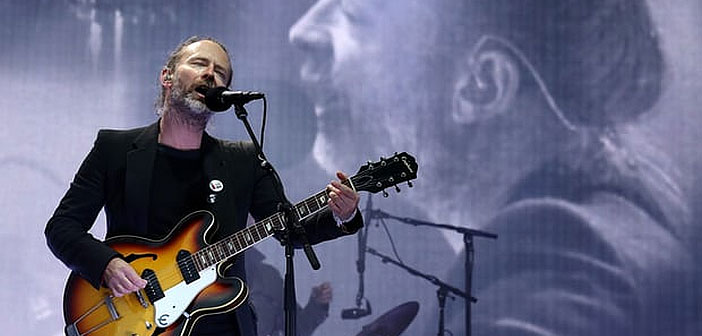“Every international artist who plays in Israel serves as a propaganda tool for the Israeli government.”
Source: The Guardian
Next Wednesday (19 July), Radiohead will step on stage in Tel Aviv in knowing and deliberate contravention of the boycott of Israel called for by Palestinian civil society and adhered to by leading cultural figures. In so doing, they will lose the respect of thousands of music fans across the region and around the world. Lead singer Thom Yorke’s arrogant response to protests against the decision revealed just how out of touch he is on this issue.In an interview in Rolling Stone magazine, he claimed the protests were “an extraordinary waste of energy”, adding that the situation was particularly upsetting for guitarist Jonny Greenwood, who has “fans on both sides” and an Israeli wife: “All these people stand there at a distance throwing stuff at us, waving flags, saying, ‘You don’t know anything about it!’ Imagine how offensive that is for Jonny.” An acknowledgement that offence might be caused to Palestinians – whose calls Radiohead have decided to ignore – was conspicuously absent from Yorke’s rant.
Other critics of the boycott make more serious allegations against the protesters. Some peddle the line that they are motivated by antisemitism. The “proof” they offer for this is that in a deeply troubled world full of oppressive regimes, Israel is unfairly “singled out” for criticism. The allegation is unjust and misleading for several reasons.
First, it conflates Zionism (the political movement that founded Israel) with Judaism. Zionists have systematically attempted to make such a conflation, but many Jews and others reject it. As the editors of A Time to Speak Out: Independent Jewish Voices on Israel, Zionism and Jewish Identity state: “It is because successive Israeli governments claim to represent Jews in general, a claim that is as groundless as it is injurious, that it is vital to speak out. Moreover in the United Kingdom those who claim to speak for British Jews collectively (or allow that impression to go unchallenged) tend to reflect only one position on Israel’s conflicts: that of the Israeli government. In reality, however, there is a broad spectrum of opinion among Jews in Britain – just as there is among any other Jewish population in the world – on Israel and on Zionism. Many Jews refuse to view these subjects through a narrow ethnocentric lens. They base their opinions instead upon universal principles of justice and human rights. And they refuse to accept that Israel alone offers a viable identity for Jews.”
Labelling all critics of Israel antisemitic is like labelling all those who opposed apartheid in South Africa anti-white. It is a bullying tactic used to suppress opposition. Besides, it’s not true that Israel has been “singled out” for criticism. Many of the same activists who wave Palestinian flags at Radiohead gigs also actively oppose the Tory government in the UK, President Trump’s administration in the US, and the brutal regimes in Saudi Arabia, Bahrain, Egypt and elsewhere. Their critics’ confusion stems from a misunderstanding of boycott. Boycott is not a universal principle to be applied to every disagreeable regime, it is a political tactic. In most situations it would be the wrong tactic. It is only the right one when two criteria are met:
1. That those on the sharp end of oppression – in this case the Palestinians living in Israel and the occupied territories – are calling for a boycott. Not just one or two of them, but a majority of civil society.
2. That the boycott has a realistic chance of having a positive impact on the situation.
These criteria were met in the 1980s for South Africa, and they have been met again for Israel now. In 2005, 170 Palestinian civil society groups including trade unions, women’s organisations, community groups and NGOs voted to issue a call for a boycott of Israeli institutions including a cultural boycott. That call remains in place, and is campaigned for by the Palestinian Boycott National Committee. In 2010 Faithless, the band I was in at the time, declined offers to play in Israel, joining the boycott in solidarity with the Palestinians.
It is also evident that the boycott is having an impact. It has successfully drawn attention to Israel’s numerous violations of international laws and the misery inflicted on Palestinians.
This worries the Israeli government and its supporters, who have long tried to use culture to their advantage. Government agencies spend huge sums of money in attempts to brand the country as liberal and progressive. Tel Aviv is promoted as a hedonistic, open-minded party city – an image made more credible by frequent visits by some of the world’s best-known bands and DJs. This manufactured image matters to Israel. Music fans can dance, drink and party long into the night, blissfully distracted from the suffering endured by Palestinians.
In effect, music helps to drown out the cries of the oppressed. As several Israeli musicians explained in a recently published open letter to Radiohead: “Every international artist who plays in Israel serves as a propaganda tool for the Israeli government. International performances in Israel serve the government’s agenda of whitewashing its war crimes against Palestinians by creating a “business as usual” atmosphere wherein the status quo, a reality of colonisation and military occupation for Palestinians, becomes normalised.”
The cultural boycott is a refusal to be complicit in this crime. It is a nonviolent and effective way to highlight the reality of what’s going on and to apply pressure for change. We should all support it and the wider Boycott, Divestment and Sanctions (BDS) campaign. It’s hugely disappointing that Radiohead have decided not to.
Sound System: The Political Power of Music by Dave Randall is published by Pluto Press.

